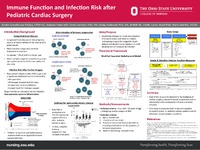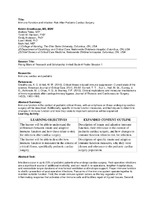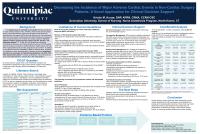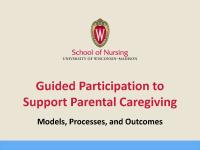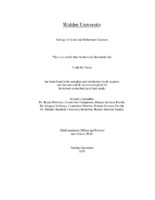| dc.contributor.author | Greathouse, Kristin | en |
| dc.contributor.author | Yates, Andrew | en |
| dc.contributor.author | Harrison, Tondi M. | en |
| dc.contributor.author | Anderson, Cindy M. | en |
| dc.contributor.author | Wold, Loren | en |
| dc.contributor.author | Hall, Mark | en |
| dc.date.accessioned | 2016-09-16T14:23:37Z | |
| dc.date.available | 2016-09-16T14:23:37Z | |
| dc.date.issued | 2016-09-26 | |
| dc.identifier | LEAD16PST29 | en |
| dc.identifier.uri | http://hdl.handle.net/10755/620278 | |
| dc.description | <p>Leadership Connection 2016 Theme: Personal. Professional. Global. Held at the Marriott Downtown, Indianapolis.</p> | en |
| dc.description.abstract | <p>Session presented on Sunday, September 18, 2016:</p>
<p>Infections occur in up to 20% of pediatric patients who undergo cardiac surgery. Post-operative infections are a significant source of additional morbidity, and can result in re-operations, lengthen hospital stays, and necessitate longer durations of mechanical ventilation and inotropic support. Proper immune function is vital for preventionof post-operative infections. Two arms of the immune system operate together to maintain suitable function. First, the innate immune system serves as the key regulator of the inflammatory response that activates other immune cells and facilities repair of injured tissues. Second, the adaptive immune response confers specificity to the immune response and their cells typically require presentation of antigen by a member of the innate immune system in order to become activated. The combination of local trauma, cardiopulmonary bypass as well as pulmonary and myocardial reperfusion results in a significant systemic inflammatory response post-cardiac surgery. The compensatory anti-inflammatory response syndrome is activated to counteract this pro-inflammatory surge. This involves the elaboration of anti-inflammatory mediators resulting in down-regulation of the pro-inflammatory response and inhibition of leukocyte function. If the compensatory anti-inflammatory response is severe and persistent, it represents a form of secondary immune deficiency, which can profoundly affect immune function. This immune suppression has been demonstrated in critically ill children and adults following sepsis, trauma, and severe viral infections, and is also evident post-cardiac surgery. It is currently unknown how cardiac surgery impacts both innate and adaptive immune function in pediatric patients. Therefore, the purpose of this study is to gather data in pediatric cardiac surgery patients and demonstrate the incidence of cardiac surgery induced immune suppression. In addition, this study will be the first of its kind to evaluate innate and adaptive immune function and determine their relevance to post-surgical outcomes, namely infection. The study described will test the hypotheses that: 1) Cardiac surgery will be associated with a reduction in innate and adaptive immune function in comparison to pre-operative function, with those undergoing cardiopulmonary bypass having the most severe reduction, and 2) Severe, early reductions in innate and adaptive immune function will be associated with increased risk for the development of nosocomial infection.</p> | en |
| dc.format | Text-based Document | en |
| dc.language.iso | en_US | en |
| dc.subject | Cardiac | en |
| dc.subject | Immune | en |
| dc.subject | Pediatric | en |
| dc.title | Immune function and infection risk after pediatric cardiac surgery | en |
| dc.type | Poster | en |
| dc.rights.holder | <p>
All rights reserved by the author(s) and/or publisher(s) listed in this item record unless relinquished in whole or part by a rights notation or a Creative Commons License present in this item record.
</p><p>
All permission requests should be directed accordingly and not to the Sigma Repository.
</p><p>
All submitting authors or publishers have affirmed that when using material in their work where they do not own copyright, they have obtained permission of the copyright holder prior to submission and the rights holder has been acknowledged as necessary.
</p> | en |
| dc.description.note | <p>Items submitted to a conference/event were evaluated/peer-reviewed at the time of abstract submission to the event. No other peer-review was provided prior to submission to the Henderson Repository.</p> | |
| dc.type.category | Full-text | en |
| dc.evidence.level | N/A | en |
| dc.research.approach | N/A | en |
| dc.contributor.department | Rho Nu at-Large | en |
| dc.author.details | Kristin Greathouse, CPNP-AC; Andrew Yates, MD; Tondi M. Harrison, RN, CPNP; Cindy Anderson, RN, WHNP-BC, FAHA, FNAP, FAAN; Loren Wold, FAHA, FAPS; Mark Hall, FCCM | en |
| dc.conference.name | Leadership Connection 2016 | en |
| dc.conference.host | Sigma Theta Tau International | en |
| dc.conference.location | Indianapolis, Indiana, USA | en |
| dc.date.conferenceyear | 2016 | |
| dc.contributor.affiliation | The Ohio State University, Columbus, Ohio, USA | en |
| dc.description.reviewtype | Abstract Review Only: Reviewed by Event Host | en |
| dc.description.acquisition | Proxy-submission | en |
